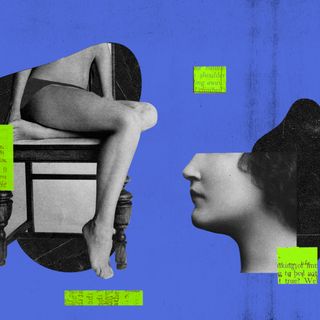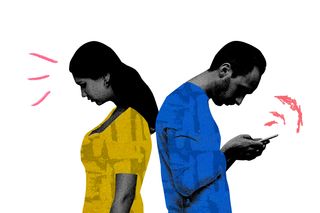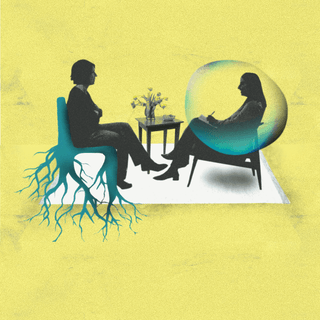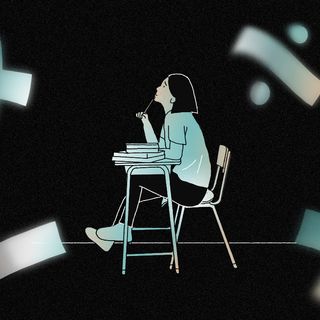
How ‘Phubbing’ Ruins Relationships, According to Science
Phubbing can make physical interactions less satisfying — not just for the ones being phubbed, but also for the ones indulging in it.

“Phubbing” — or “phone snubbing” — is the act of ignoring people we’re physically hanging out with, in favor of the virtual world we’re connected to through our phones. It might sound like yet another new-age phenomenon that’s given people an excuse to come up with yet another inconsequential portmanteau — but, in reality, the phenomenon is a lot more pervasive than it appears. “[Phubbing] may not be part of your everyday vocabulary, but it’s almost certainly part of your everyday life,” notes an article in Time.
In the digital age that we’re living in, most of us have been phubbed — some of us, perhaps, are guilty of phubbing, too. Research suggests that studies that more than 15% of people phub others at least four times a day, and 32% report being at the receiving end of phubbing more than twice a day.
Phubbing ruins relationships. To start with, phubbing can make physical interactions less satisfying for everyone involved — even for the ones indulging in it. Perhaps, their fractured attention prevents them from enjoying a conversation they’re constantly checking in and out of.
It is, of course, understandable to feel the need to check one’s phone every once in a while. But when it happens so frequently that it ends up isolating those around us, phubbing becomes a bit of a problem. As most phubees will admit, it can feel rather disrespectful to be accorded lesser importance than an inanimate, rechargeable, hand-held device — especially so, when the phubber isn’t dealing with a crisis, but simply scrolling through memes on Instagram and Reddit.
For those being phubbed, the act threatens four “fundamental needs” we have as human beings: belongingness, self-esteem, meaningful existence, and control.
Related on The Swaddle:
Why Ghosting Is Not Always a Form of ‘Emotional Abuse’
“It’s ironic that smartphones, designed to foster a sense of connectedness and closeness with the people in our lives, are actually impeding relationships and creating an atmosphere of social exclusion,” Nadia Nooreyezdan had written in The Swaddle earlier. “Having a conversation with a person, face to face, involves a lot more than simply hearing what they’re saying — it means being attuned to the nuances of tone, facial expression, and body language. But unfortunately, with our culture of phubbing, we’re losing our ability to empathetically communicate with each other.”
The loss of communication confronts us with the prospect of phubbing damaging our relationships more than we might realize. As a 2016 study found, in romantic relationships, phubbing can breed dissatisfaction and aggravate relationship-associated anxiety among phubees. A subsequent study, published the next year, found that phubbing also impacted the length of relationships adversely, and served as “a significant risk factor for depression.”
Now, a new study — published recently in Computers in Human Behavior — found that being phubbed can lead one to develop “illicit feelings of doubt about their partner’s commitment to them, which may induce feelings of stress and anxiety.” The survey of 346 individuals, suggests that it can result in phubees attempting to allay their anxieties by surveilling their partners’ electronic communications.
“To cope with these feelings, some people will snoop into their partner’s online activities to gather information on what their partner is doing when they are so busy on their phones.” explained lead author Janneke Schokkenbroek from Ghent University in Belgium.
Yet another study — also published recently in Computers in Human Behavior — found that being phubbed can result in anger, jealousy, and frustration, which causes phubees to participate in a “vicious cycle of resentment and retaliation.” This can manifest as retaliatory phubbing — where the phubee chooses to beat their phubbing partner at their own game, thereby kickstarting the aforementioned “vicious cycle.”
Related on The Swaddle:
Why the Trend of ‘Trauma Dumping’ On Internet Strangers Needs to Go
The retaliation, however, was motivated more by boredom than a desire to seek revenge on one’s partner, the authors noted.
It’s pertinent to note, though, that phubbing, too, isn’t necessarily intended to disrespect one’s partner — or absolutely anyone else present. Often, people try to cope with their own social anxiety by fixating on their phones during physical interactions with people. Nonetheless, it’s important to ensure that our coping mechanism doesn’t end up engendering discontent in relationships that we, too, have chosen to be present for — physically, at least.
“Almost everyone looks at their phone every now and then while they are interacting with their partner, but it is important to realize that this may have a negative impact on our partner and our relationship,” as Schokkenbroek notes.
Phones will continue to be a part of lives — at least, in the recent future. As such, most of us are probably going to fall into the trap of phubbing our partners — even if we don’t intend to; phubbing can be an impulsive behavior, after all. To ensure that it doesn’t induce negativity in the bond we share with our partners, though, “We should be conscious of this and make sure our partner still feels validated and heard and does not interpret the phubbing behavior as a disinterest in them or the relationship,” suggests Schokkenbroek.
In fact, Schokkenbroek suggests ways to be more mindful of our partners’ feelings, “[T]he context in which the phubbing occurs might be important to consider [seeing as] for most people it is probably less of a problem when their partner is paying attention to their phone instead of them when they are both at home watching TV compared to when they are at a restaurant having dinner together… [I]t might [also] be a good idea to explain to your partner why you are looking at your phone at that moment, or to include them in the activity.”
Devrupa Rakshit is an Associate Editor at The Swaddle. She is a lawyer by education, a poet by accident, a painter by shaukh, and autistic by birth. You can find her on Instagram @devruparakshit.
Related


Is Therapy in India Inherently Casteist?
